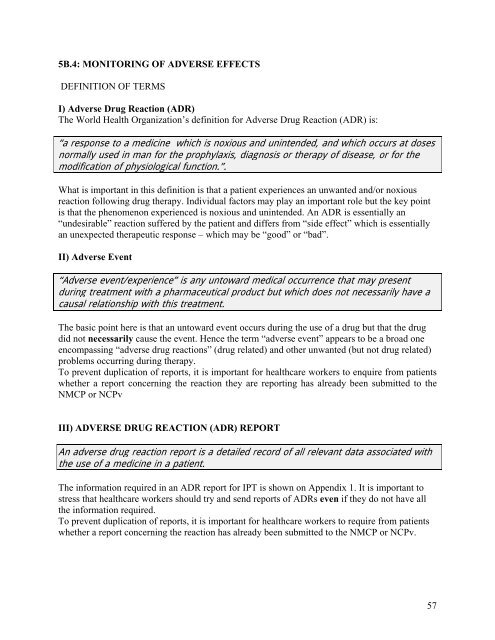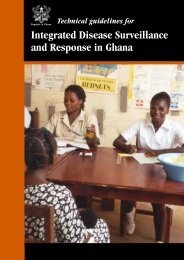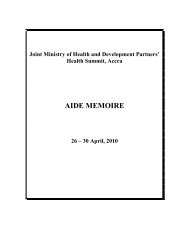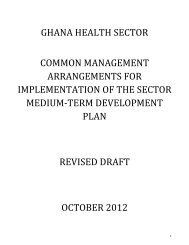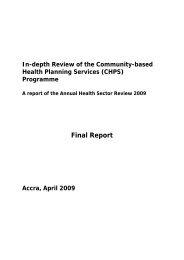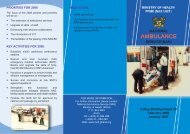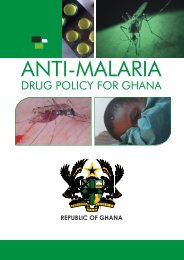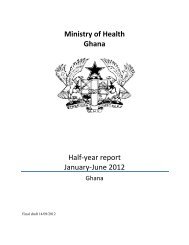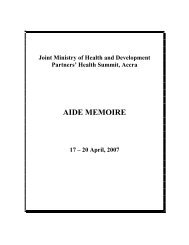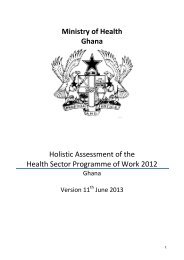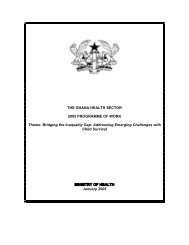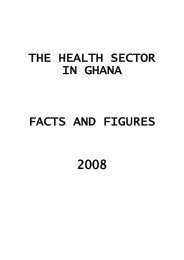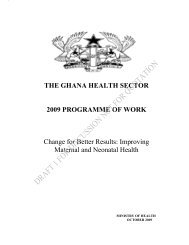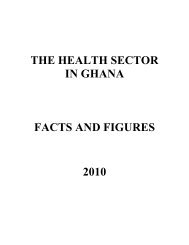Training Manual for Preventive Malaria - Ministry of Health
Training Manual for Preventive Malaria - Ministry of Health
Training Manual for Preventive Malaria - Ministry of Health
You also want an ePaper? Increase the reach of your titles
YUMPU automatically turns print PDFs into web optimized ePapers that Google loves.
5B.4: MONITORING OF ADVERSE EFFECTS<br />
DEFINITION OF TERMS<br />
I) Adverse Drug Reaction (ADR)<br />
The World <strong>Health</strong> Organization’s definition <strong>for</strong> Adverse Drug Reaction (ADR) is:<br />
“a response to a medicine which is noxious and unintended, and which occurs at doses<br />
normally used in man <strong>for</strong> the prophylaxis, diagnosis or therapy <strong>of</strong> disease, or <strong>for</strong> the<br />
modification <strong>of</strong> physiological function.”.<br />
What is important in this definition is that a patient experiences an unwanted and/or noxious<br />
reaction following drug therapy. Individual factors may play an important role but the key point<br />
is that the phenomenon experienced is noxious and unintended. An ADR is essentially an<br />
“undesirable” reaction suffered by the patient and differs from “side effect” which is essentially<br />
an unexpected therapeutic response – which may be “good” or “bad”.<br />
II) Adverse Event<br />
“Adverse event/experience” is any untoward medical occurrence that may present<br />
during treatment with a pharmaceutical product but which does not necessarily have a<br />
causal relationship with this treatment.<br />
The basic point here is that an untoward event occurs during the use <strong>of</strong> a drug but that the drug<br />
did not necessarily cause the event. Hence the term “adverse event” appears to be a broad one<br />
encompassing “adverse drug reactions” (drug related) and other unwanted (but not drug related)<br />
problems occurring during therapy.<br />
To prevent duplication <strong>of</strong> reports, it is important <strong>for</strong> healthcare workers to enquire from patients<br />
whether a report concerning the reaction they are reporting has already been submitted to the<br />
NMCP or NCPv<br />
III) ADVERSE DRUG REACTION (ADR) REPORT<br />
An adverse drug reaction report is a detailed record <strong>of</strong> all relevant data associated with<br />
the use <strong>of</strong> a medicine in a patient.<br />
The in<strong>for</strong>mation required in an ADR report <strong>for</strong> IPT is shown on Appendix 1. It is important to<br />
stress that healthcare workers should try and send reports <strong>of</strong> ADRs even if they do not have all<br />
the in<strong>for</strong>mation required.<br />
To prevent duplication <strong>of</strong> reports, it is important <strong>for</strong> healthcare workers to require from patients<br />
whether a report concerning the reaction has already been submitted to the NMCP or NCPv.<br />
57


